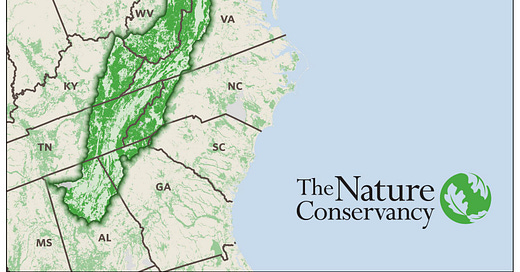Sometime in the coming weeks we’ll leave our rented home in Alençon for a new home in Western Head, Nova Scotia. For me it will be a sad day, as I’ve come to love France, and the French people, but I am also excited to explore another corner of this wonderful planet.
Around 25 years ago I moved from Ottawa to a small town in Appalachian Kentucky called Whitesburg. I moved there to manage a radio station called WMMT. They’re still a fantastic station, though very hard hit by the massive floods that hammered Kentucky last month. I now find myself returning to Appalachia, although the far northern reaches of that geographic region.
Although less mountainous than Kentucky or West Virginia, and less ravaged by coal mining, there are still parallels. Nova Scotia is not a particularly wealthy region, and my sense is that power and money are concentrated in the hands of a small group - much like the Irving family in New Brunswick. Consequently a lot of public services that other places enjoy will be be weaker of totally lacking.
On the other hand, the wish to spend as little as possible on governing the province also generally means that there’s room for individuals to chart their own paths, and room to work around rules and restrictions where needed.
Still, just as we spent a couple of years researching France using the Internet, we’re now researching Nova Scotia
Western Head, Nova Scotia is actually, according to Canada Post, part of Liverpool, Nova Scotia. Liverpool, in turn, is described by Wikipedia as a “former town” because in 1996, Liverpool disincorporated as a town and merged with the Municipality of the County of Queens to form the Region of Queens Municipality.
I’m happy to learn that the local pulp mill closed in 2012. I visited Port Alberni once and still remember the company provided car wash intended to keep people’s cars from dissolving from the stuff falling out of the air. Pulp mills are nasty.
Still, the closing of that mill reminds me greatly of the way that much of Kentucky was abandoned by the coal companies when they made the move from underground to open-pit mining. When a community relies heavily on one industry, and that industry ups and leaves, it does immeasurable damage.
What I am looking forward to once again is having our own house, on our own land, and the opportunity to make that home exactly what we want it to be. Having lived under the heavy hand of a particularly authoritarian strata council in BC I welcome that freedom.
And, honestly, I’m looking forward to breaking out the tools and doing upgrades and repairs again. I learned to really enjoy that sort of manual work while in North Vancouver.
The other thing that I learned this week is that unbelievably Liverpool is home to a community radio station. QCCR, or Queens County Community Radio is one of the success stories that arose from the CRTC’s brilliant quick and easy low power community radio program. It delights me that Liverpool was able to make that a permanent part of the town.
Looking at the schedule it’s obvious that like most community stations, QCCR is woefully underresourced, and if I’m honest a lot of the programming doesn’t thrill me, but the opportunity to get back behind a microphone and spin some discs is really appealing.
What saddens me is that I suspect that I can’t resurrect my Kentucky radio persona, where the “Double Double Radio Show” was hosted by none other than “Tim Horton.”
In the meantime my days are full of cross-Atlantic lawyers and inspectors, and the ongoing realisation that an awful lot of Canada really has no clue that much of the world exists beyond the borders of North America. Things like addresses and phone numbers, and the idea that yes, we are five hours ahead of Nova Scotia, much less NINE hours ahead of Vancouver, still can bring simple tasks to a halt.
But hey, very soon we’ll have Nova Scotia bureaucracy to enjoy!





